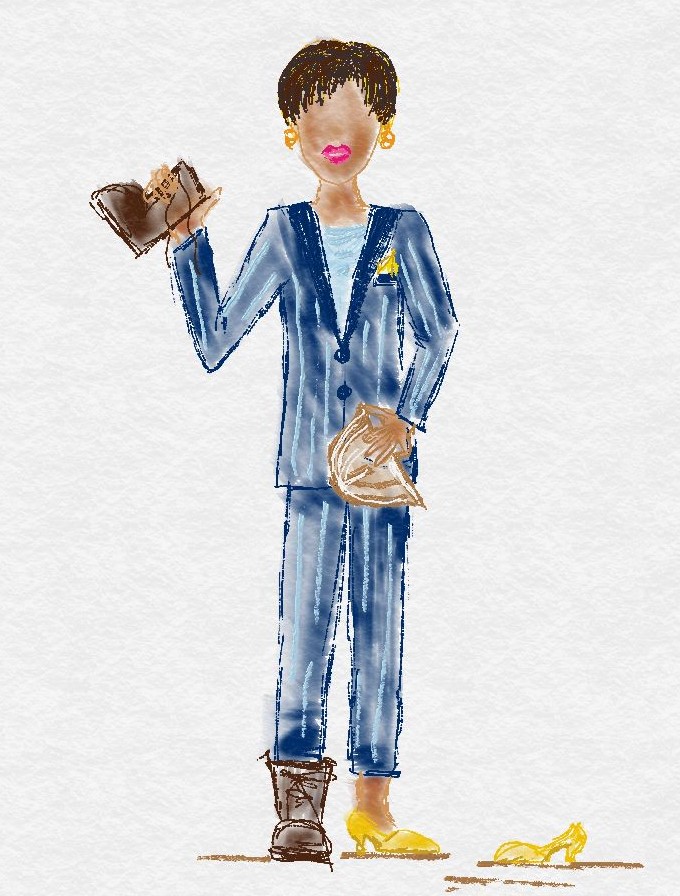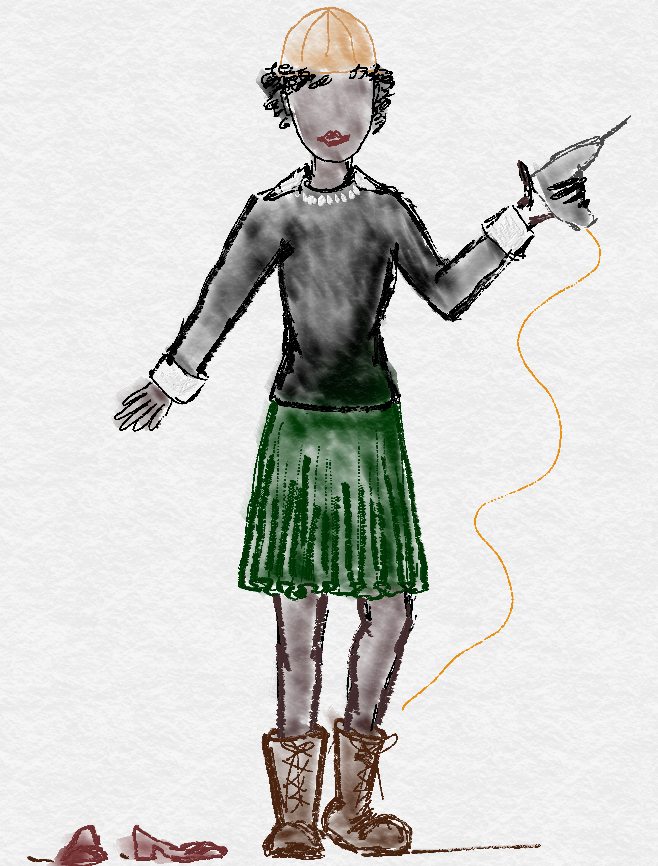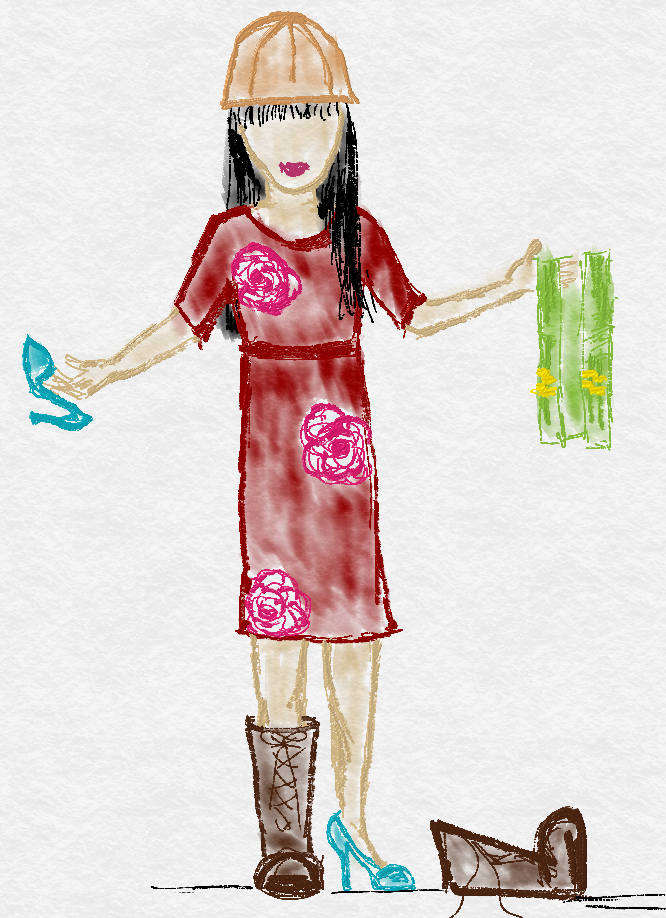Self Branding
Confidence of a Higher Order
Yes, I’m Supposed to Be Here

Confidence is a subject we have covered extensively on this forum. It should not be a surprise to anyone currently engaged in our dialogue about women’s issues in a male-dominated workplace that a lack of confidence runs rampant through our ranks. Yes, there are women who blaze a trail unencumbered by self-doubt, and they are our heroes. But the rest of us continue to wage a battle for our place in the working world with compromised armor.
I am always fascinated by those women who sail through sexist-infested waters with no apparent recognition of the doubters and haters around them. These are the women who don’t hesitate to state their opinions, do their jobs, and tell any obstructionists to get the hell out of the way. So I study them in hopes that I might learn their secrets. No retraining orders have been filed thus far, so apparently my approach has been anthropologist-worthy. In any case, I have observed some of the most inspiring attitudes from a completely unexpected source.
The first twelve years of my education (plus kindergarten) were overseen and influenced by Roman Catholic nuns. My grade school nuns were Ursuline Sisters, and my high school nuns were Sisters of Mercy. In addition, my great aunt was a Sister of Charity. I still deal with nuns from a number of orders regularly at church and through charity work. I have the utmost respect for the dedication, work ethic, organizational skills, and focus of nuns as a whole. (I left out integrity, honesty, humility, etc., because I think those are givens). I’m also in awe of the fact that they tolerate spending their whole lives in boring, sensible shoes. That’s grit.
I cannot recall a single nun who appeared to be tentative or lacking in confidence when it came to executing her duties. Yes, I have known sisters who were shy, but the vast majority in my experience have been downright commanding in their work lives. I certainly never saw a nun defer to a man simply because he was a man. Surely you have seen or heard jokes about drill sergeant-like nuns as teachers? Plays and musicals have been written about hard core, rigid nuns issuing orders and demanding respect from masses of obedient students and adults alike.
If you read the Outlander books, (and if you don’t, we cannot be friends), the author, Diana Gabaldon, wrote a passage in which the main character reflects on where she learned to have a commanding presence in her role as a battlefield nurse during World War II. She observed nuns ordering soldiers around who were twice their size and gaining cooperation by not accepting anything else. She learned by their example that if she barked an order and acted authoritative, many men would simply comply. In a major role in one of the books, the Mother Superior of a hospital in France directs men and women about equally, never giving either subordinates or colleagues the opportunity to disagree. The character would be called “fierce” in 2018, and she serves as inspiration for the heroine when she needs to marshal her courage.
It might seem a bit counter intuitive to look for help with confidence from a group of women whose very vows could be perceived as subservient. They do not attain positions of commercial success in our society. They are forbidden from accumulating wealth or possessions. They are committed to advancing the work of their order and the church instead of their own desires.
But nuns are also some of the smartest and most well-educated women around. Sister Mary Prisca Pfeffer, my former high school principal and English teacher, died at the age of 96 with more college degrees than I could count. My great aunt insisted that my dad speak only in French during the summer so he could learn the language better. And these two examples are just the tip of the iceberg.
So where does their example leave the rest of us? More importantly, how do they achieve such confidence, and where can we get some of that?
Of course, part of the answer must include the fact that the sisters believe God is on their side. How can you not go about your work with forcefulness and aplomb when you believe that your mission has divine approval?
But beyond the obvious, I feel that many nuns stride purposefully through their vocation because they truly believe they are supposed to be there. Well, of course they do, you say. That’s no revelation. Otherwise they wouldn’t have taken vows and devoted themselves to the lives they have, right? So, if they believe so strongly in their rightful places in their roles, why don’t we?
History, of course, is one answer to that question. Nuns have filled the roles of nurses and teachers and missionaries feeding the hungry for years. They don’t have to overcome the fact that there were few, if any women in their roles 50 years ago. In fact, nuns are all women!
But what if we borrow their attitude? What if we simply decide we’re supposed to be here? We adopt that don’t-waste-time-arguing-with-me-because-it-won’t-do-you-any-good demeanor and make those around us believe it?
Before I learned that it was okay to be my age (see this post) I often joked that I graduated from college in 2007. I have told many people that others will be believe even something improbable if you look them directly in the eyes and sound confident in your statement. Actually, that’s usually true. So what if we just deal with others in the workplace every day as if it’s understood that we should be there (BECAUSE IT’S TRUE), and completely tune out any doubters. It would be even more fabulous if we could slap the knuckles of all of those doubters with a ruler, but I think there might be various local and federal laws against that.
I urge you to try the “Nun Approach” in your workplace this week. Of course it should be accompanied by all appropriate courtesies, particularly if you work anywhere that could be construed as southern. (“Yes, sir, you have inadequate clearance around your rebar for shafts C12 and F7. Those need to be fixed ASAP or your concrete is going right back to the plant. Thank you for getting this done right now.”)
The most important part of this plan is the change that will take place in your own head. If you don’t let anyone else stop to question your presence in your job, you’ll forget the question it, too. Sister Mary Prisca NEVER let anyone question her authority or her expertise, and she was right. I can diagram the previous sentence for you as proof. So we need to put her and other sisters on a pedestal and follow their lead. We’ll just wear different shoes.
What Price Ambition?
Hey – Your Ambition is Showing
By Ann Schmelzer, Guest Contributor

(Editor’s Note: Ann is a top-level manager for a major international manufacturer. Someday we will all be working for her, and that’s not a bad thing. Although she is not in the deep foundations industry, she spends all day every day with men, most of them engineers. It’s no wonder her right brain takes over on the weekends, doing things like starting one of the most successful food and beverage festivals in the Midwest and coaching raging hormones girls’ soccer).
The other day I sent Peggy a screen capture of an article I was reading that made me think of her. What I subsequently learned is: Be careful what you text your friends who have a blog that is topically relevant… I’m kidding.
The article I sent was Reese Witherspoon’s recent essay in Glamour on ambition (Glamour October 2017). The screen capture itself highlighted a study that single female Harvard MBA students downplayed their career ambitions in front of male classmates for fear of possibly hurting their marriage prospects. I’m not trying to share business that isn’t mine (we’ll get to my business later), but Peggy had a dating experience in which her full life and busy schedule were questioned by an unnamed gentleman in the following way— “But don’t you want to be happy?” Dear God… what year is it? Hence, why I sent Peggy the screen capture, and hopefully a much-justified chuckle.
Reese writes an eloquent essay on the topic of ambition. The fact that she had to is somewhat saddening to me; but, at least we’re talking about it. At one point she states “Run away from a man who can’t handle your ambition. Run. So many men think ambition is awesome and sexy!” I agree Reese, but a lot of men don’t wear “I find drive emasculating” on a T-shirt to the first date. You learn that the person in question says one thing and actually wants another over time—sometimes a little time, sometimes a lot of time.
In my case, I learned it slowly– death-by-a-thousand-papercuts-style over the course of four years. In my early twenties I dated a guy who, at the time, I was very much taken with and it seemed that the feeling was mutual. He talked a great game; I mean a great game. When we talked about my career ambitions there wasn’t a whiff of hesitation in his voice. He seemed to be genuinely into my ambition.
Things eventually crashed and burned during a period of time when his career was floundering. I, by contrast, was in the middle of two masters’ degrees and a career that wasn’t floundering. I’ll spare you, dear readers of Underpinnings, all the gory details but, in hindsight, the thing that made me the angriest was that I found out he had been cheating on me with the Sunday school teacher from his family’s church. The. Sunday. School. Teacher. The cheating alone was a bitter enough pill to swallow, but the chosen partner was really the icing on the cake. Don’t get me wrong, I’m guessing she didn’t know I existed. (If she did, the irony there is on an almost incomprehensible level). Upon Monday morning quarterbacking the whole situation, it is my assumption that his need for that relationship was to shield his ego from the uncomfortable mirror I held up to his own lack of progress. Perhaps that’s me shielding my own ego from the fact that my relationship crumbled because I couldn’t pull off the perfect balancing act of non-threatening and go-getter.
The thing is that I had never hid who I was and, in the beginning, it was the greatest thing ever. By the end, the look on his face all but said “wow, you’re really like this all the time”… and not in a good way. Did he think I was lying in the early days? If I had been, wouldn’t that have been worse for everyone? These are questions not worth pondering.
So, I was the MBA-educated girl who did not tamp down her ambition. If I had, perhaps I could have nursed that relationship along for a bit but, in the end, I’m sure it would have come to a similar demise. Regardless, there are lots of different ways to interpret the Harvard study. Maybe the women being interviewed thought “What’s the harm in softening the wording here? I can still go get it done; that’s my business”; or, “These questions rarely go well for me so here is my canned response”; or, “Remember when you beat that boy in the math bowl in middle school and got uninvited to the dance on Friday?”. There are a lot of possibilities but, in the end, what a difficult commentary on the state of gender equality.
Judith Warner, who is a senior fellow at The Center for American Progress writes “Although women have outnumbered men on college campuses since 1988, they have earned at least a third of law degrees since 1980, were fully a third of medical school students by 1990, and, since 2002, have outnumbered men in earning undergraduate business degrees since 2002. They have not moved up to positions of prominence and power in America at anywhere near the rate that should have followed. In a broad range of fields, their presence in top leadership positions—as equity law partners, medical school deans, and corporate executive officers—remains stuck at a mere 10 percent to 20 percent. Their “share of voice”—the average proportion of their representation on op-ed pages and corporate boards, as TV pundits, and in Congress—is just 15 percent. In fact, it’s now estimated that, at the current rate of change, it will take until 2085 for women to reach parity with men in leadership roles in our country.” With statistics like that, who can blame the women of Harvard?
Later in the article Reese comes back to “All we can do to create change is work hard. That’s my advice: Just do what you do well. If you’re a producer, you’ve got to produce. If you’re a writer, you’ve got to write. If you’re in corporate America, keep working hard to bust through the glass ceiling. If you want our voices to be represented in government—and I think we’re all getting behind that idea now—encourage women to run and help them with their campaigns. If you are one of those people who has that little voice in the back of her mind saying, “Maybe I could do [fill in the blank],” don’t tell it to be quiet. Give it a little room to grow, and try to find an environment it can grow in.” I couldn’t say it better myself.
Are You a Feminist?
What Does That Even Mean?

Are you a feminist? What exactly does that mean? And is it important to you to identify yourself as such?
Megyn Kelly, former Fox News host and current NBC news personality, was widely derided in 2016 by her refusal to label herself as a feminist. She stated that the term had become divisive and had negative connotations. Many women took that position as a cop out and an avoidance of the true issue: that being branded a feminist would alienate many of the average Fox viewers. They said that she needed to stand up for women as a whole, even if it meant losing her job at Fox.
So what does the average bear think a feminist is? The simple answer (obviously) would be that a feminist is a person who believes that women are equal to men and should be accorded the same respect and opportunities. But, unfortunately, many years of history have colored individual perceptions. In addition, the actions and words of some in the heat of the battle on inequality have generated a decidedly negative vision of what a feminist represents and who she (or he) is.
Gloria Steinem no doubt was the trailblazer in the modern world of feminism, though not the original pioneer by a long shot. Elizabeth Cady Stanton and Susan B. Anthony were the Lewis and Clark of the equality wilderness, raising issues and bucking the norm long before Ms. magazine challenged the accepted role of women in U.S. society. Julia Ward Howe, Ida B. Wells, Sojourner Truth – these women functioned and rebelled in conditions we can’t even imagine. They made people face truths and answer questions that weren’t comfortable or conventional. Thanks to them, you’re sitting at your desk working on a tieback design or standing on a construction site yelling at people about clean bottoms.
Unfortunately, many of the men (and some of the women) of the times reacted to these women by assuming that since they didn’t want to fill a normal societal role, they didn’t want to be a “normal woman.” Translation: They didn’t like men and they didn’t want to be feminine. Although part of this was ignorance and part of it was an attempt at control through shaming, the ugly side effect was a lingering implication that feminists didn’t like being womanly and they were against men.
Organized feminist actions in the 1970s compounded this stereotype. The bra-burning, tie-wearing, loud, angry women that demonstrated for equal pay and equal opportunities reinforced the notion that feminists are rude, unfeminine, “coarse” ball-busters who don’t like men and have no interest in being nice to them. In fact, they want reparations for 12,000 years of oppression.
It’s often so easy to forget that people who start revolutions have to overcome years, decades, centuries of inertia. Society has been functioning as X, and now someone wants it to be Y. This doesn’t happen easily. It takes anger, it takes aggression, it takes breaking out of stereotypes just to get people’s attention. Changing the average person’s mind is another mountain to climb once you have their attention. It’s no wonder the early feminists seemed angry. They were trying to get people to listen! They were TIRED!!! They were exhausted from trying to overcome centuries of societal inertia. They were worn out from attempting to use logic to overcome fear and emotion. They were frustrated from worrying that they would be unsuccessful.
Despite the reason, the negative stereotype of a feminist still exists with many people. The purpose of all the hard work of Ms. Cady Stanton and Ms. Steinem and the others was to allow us all to be equal, regardless of who we are. They didn’t mean to support just women – they intended to establish equality for everyone. Purple, three-headed Martians would be accorded the same freedoms and rights as WASP males and women of east-central northern Irish descent who were born on the subway. But the residue of the battles remains, and the feminist brand often is not a positive one.
Some modern women, particularly those of a certain age, believe that to resist the feminist label is to abandon the cause. You are a failure if you don’t embrace the title and forge on with the battle. But are you? Do we shirk our duties as progressive women if we don’t deem ourselves warriors?
On a personal level, I have a serious problem with being given any label (except that of a University of Louisville Cardinal). Whether the label is true depends on how you define it. You might define it differently than I do. Beyond the definition, I might decide that I want to change in the future. The issue might change. DO NOT TELL ME WHO I AM.
I also don’t like the idea that being a feminist means tipping the scales against men. Equality means equality, not “We should get lots extra to make up for all that crap in the past.”
Here at Underpinnings, we have noticed an interesting development in this label issue. Younger women in our field are not as comfortable making a fuss about equality or their rights in the workplace, and they often aren’t ready to proclaim themselves feminists. In some cases, it’s because they don’t see their world as that bad. It’s not, because we’ve made progress. In other cases, they see us more seasoned professionals as being too confrontational and ready to raise hell. (See my previous comments on being exhausted from fighting the battle for so long). To them, the idea of being a feminist smacks of unnecessary and insensitive crusading.
In the case of Ms. Kelly, I believe that the whole point of feminism is to get us to the place where women can do what they want with their careers. When she was at Fox, she wanted to be at Fox. Was she wrong to monitor her language so as not to alienate the very audience she wanted to court? Yes, you say – she has an obligation to do what’s right for the advancement of all of us. Does she? Maybe the success of feminism is that she can express her opinion, whatever it is, and she gets to be the person to figure out what strategic moves she needs to make to have the career she wants. Whether that career is worthwhile is her business.
A necessary component of succeeding in war is unity. When the war is over, troops often have a difficult time establishing themselves as individuals, particularly if the issues from the war aren’t completely resolved. There is even fear of functioning outside of your unit, outside of the war. The need for determination and grit are so compelling during the battle that to give it up seems suicidal. Those women who fought the hardest of the wars of the past no doubt fear we will lose all the ground we’ve gained if we give up for even a second. They say that women are traitors who won’t go by the name “feminist,” lest we all end up back in the kitchen, illiterate with no freedom.
Perhaps we need a new word, one that represents our goal of equality for all, which was the original purpose. Allofusist? Everyoneist? Peopleist? We need to refocus on the fact that we celebrate women, not that we denigrate men. And we need to acknowledge that one of the spoils of this war was supposed to be our right to call ourselves whatever we want and carry out our personal and professional lives however we want. Ms. Kelly doesn’t have to call herself a feminist as far as I’m concerned. It won’t affect my ability to be what I want, which of course is a Cardinalist.
Finding Your Voice
Speaking Up and Speaking Out

Recently I have had conversations with some of my friends and colleagues in the industry to try to explain a phenomenon I can’t quite wrap my head around. In a situation where there are a large group of professionals, are women are more inhibited to voice their opinion?
Here’s an example: the Deep Foundations Institute (DFI) holds an annual Hal Hunt Lecture on Communications. In 2015, the guest lecturer was Billy Beane, former professional baseball player and owner of the Oakland A’s. He is famous for applying statistical analysis to the evaluation of players. Beane delivered his lecture to a standing room only crowd which consisted of perhaps 90% men. Following the speech he entertained questions, all of which came from men in the audience. I am stereotyping but you could argue that the men who asked the questions were sports fans, or A’s fans (the conference was in Oakland), or fans of Beane himself. Now fast forward to 2016, when DFI’s Women in Deep Foundations Committee solicited sponsorships and selected the first female Hal Hunt lecturer- Dr. Mae Jeminson, the first African American woman in space. Dr. Jemison was a very captivating speaker, especially because she “nerded out” for a group of well, nerds. The audience in this case was very similar to the prior year: about 85% male. Unfortunately, there wasn’t much time for questions afterward— Dr. Jemison could only entertain 6 or 7. But not one of them came from another woman. I have to admit I was very disappointed about that. Why? Because I wanted to visibly express how important and significant it was for the women in the room to have her there.
In the Beane lecture I was trying to think something to ask him, for the sole purpose of being a woman who spoke out with a clever question. Nothing came to mind, and if I couldn’t think of a good question then I didn’t want to ask it. Also, I only began trying to think of a question once the Q & A period began, not throughout the lecture. So when Jemison spoke, I was prepared. As chair of the WiDF committee, I had the extreme honor of meeting Jemison and introducing her. I didn’t want to take any more floor time by asking my own question. But I could recruit others for the cause. As attendees gathered for the lecture, I scurried around and asked about 10 different women if they would consider asking a question following the lecture. I held the microphone at the talk’s conclusion and brought it over to those people raising their hands with questions. But as far as I could see, not one woman held up their hand while the room was full of questions from men.
I am trying to understand this better. I can tell you some general thoughts and preferences I have about speaking up in a crowd. I am generally content to listen passively to a debate or discussion unless I feel strongly about the point I am making or have a motive behind speaking up (e.g. visibility). If I don’t speak up it doesn’t mean that I don’t have an opinion. But I often keep quiet and absorb what is going on in the discussion. I also know that if I am putting effort into formulating a response, I don’t get as much out of the dialogue.
I don’t respond well to someone urging me not to be shy or to “come out of my shell”. This isn’t an issue of shyness. Those who know me well know that beneath my (hopefully?) sweet and personable exterior I have a strong personality and I am very vocal about things that bother me or excite me. In a group setting this often doesn’t come through. Sometimes I don’t feel like exposing myself and would rather make a more personal connection one on one or in a smaller group. I would much rather stay quiet on many group topics including technical issues (unless it is the corrosion protection of soil nails).
I must also admit to waiting to get a feel for the flavor of the participants in a group conversation before sticking my neck out. I wait to hear part of the discussion to get a better idea of whether my thoughts will be well received and will resonate with others in the crowd. Why? I have yet to see a Facebook debate about politics, sleep training your child, or whether cauliflower is a valid pizza crust that ended with someone being swayed to the other side, or even ended in a civil manner, so I often think what’s the point of even trying?
Now let’s talk about why my question had to be a good one. We’ve all heard the phrase “there are no stupid questions”. And I absolutely agree with that…unless they are my own. I want my questions to be thorough, respectable, and witty if possible. I want to impress the person I am asking with the depth of understanding that I have about the topic, but appear humble and willing to receive the knowledge they are about to impart. Not to mention bonus points if the question is useful or meaningful for other listeners as well. I am slowly but surely working on these inclinations. I believe this is one of the hurdles that many women need to overcome: to stop judging ourselves so harshly.
There are times when I am on a conference call for example and don’t follow the line of conversation. In the past I was embarrassed to ask for clarification, and assumed that I would figure it out myself later. I didn’t want to hold up the call or inconvenience anyone. This goes hand in hand with a propensity to apologize for things. My softball coach tried so hard to break me of that habit. When I threw a bad pitch in practice I gushed sorries at him and the catcher. But you know what they say, there’s no sorry in softball!
I think these tendencies are factors in some women avoiding STEM careers. A study (Dweck 2007) found that 5th grade girls routinely outperform boys in school subjects, including math and science. But when given an unfamiliar or complex subject, girls were quick to give up—those with higher IQs were actually more likely to quit. Boys saw the difficult material as a challenge and redoubled their efforts. Realizing these general predispositions can help us mentor young women in our field as well as save us from ourselves.
So, should we force ourselves out of our comfort zones? Men that I have discussed this with have assured me that it is just as difficult for many guys to speak up in a group setting. Some have indicated that throughout their lives it has been less socially acceptable for them to keep silent, so they have been forced against their introverted personalities to be vocal. I am glad to hear this type of revelation from men because it reinforces the point that personality and environmental influences are major factors as well. Of course there are also plenty of men and women who like to hear themselves talk.
One male colleague that lent his wisdom on the topic pointed out that all of these numbers and observations are skewed by the male to female ratio in geotechnical engineering. So something that seems to be an overwhelming pattern, such as only men asking questions at the DFI Hal Hunt lectures, actually makes sense for the high percentage of men in attendance.
In conclusion, I believe we need to speak up and speak out, even if it goes against our natural affinities. Do you feel comfortable speaking out or do you have to force yourself to be vocal?


